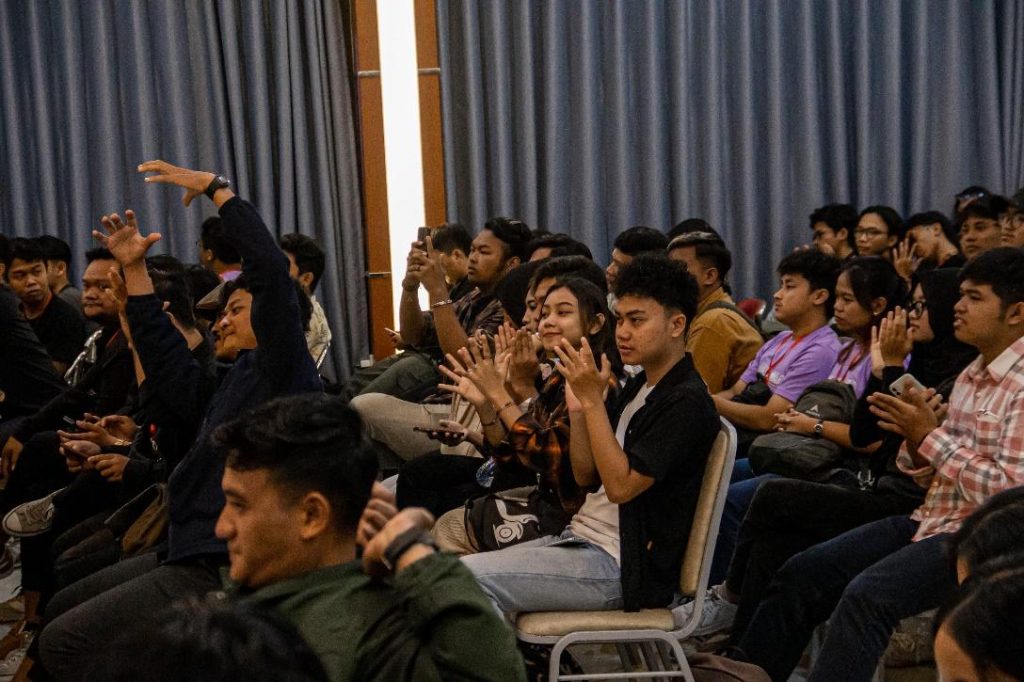
BREAKING NEW PATHWAY FOR TRADITIONAL INDONESIAN MUSIC
LOKOVASIA 2024: BREAKING NEW PATHWAY FOR TRADITIONAL INDONESIAN MUSIC
Faculty of Letters
Visual communication design
September 5, 2024
Learning and Students, Student Learning and Activities
SDG 1
Lokovasia 2024, which will be held on September 2, 2024 at the State University of Malang, is not only an event to celebrate the richness of Indonesian traditional music, but also has a broader dimension, namely contributing to the Development Goals. In this event, aspects of cultural preservation are combined with economic empowerment, especially for communities that live from the arts and culture sector.
Indonesian traditional music not only has high artistic value, but is also an important part of the livelihood of many communities in various regions. Lokovasia 2024 aims to open new avenues in community empowerment through traditional arts, thereby contributing to poverty reduction. By providing a platform for traditional artists from various corners of the country, this event provides economic opportunities for them through exposure, networking, and skill enhancement.
Not only that, this event also serves as a platform for traditional musicians to collaborate with the modern music industry, which has the potential to increase income and access to a wider market. Local artists who are often less accessible to the development of the mainstream music industry, get the opportunity to introduce their work to a wider audience.
Lokovasia 2024 will not only focus on music performances, but will also hold various workshops and training. Here, participants can learn about traditional music marketing strategies, career management, and utilizing digital technology to sell their work. This education is expected to increase the economic independence of local artists, especially those from vulnerable groups who are directly affected by poverty. The skills gained from this training will not only be useful in the field of music, but can also be applied in other small businesses, such as handicrafts, traditional clothing, and other local products that can be combined with cultural elements.
Traditional music often reflects local wisdom and the economic potential of the region. For example, the making of traditional musical instruments such as gamelan or angklung involves many local artisan communities who rely on their skills to make a living. By promoting traditional music, Lokovasia 2024 indirectly supports the development of the creative economy sector at the local level. In addition, with the increasing interest in traditional music, the tourism industry can also be boosted. Tourist villages that offer cultural experiences, including music, can become new destinations for tourists, which will ultimately increase the income of the people in the area.
Lokovasia 2024 is also an event to strengthen cooperation between the government, industry players, and cultural communities. With the support of local governments, universities, and sponsors, this event opens the door for cultural-based economic empowerment programs. Through this collaboration, resources can be allocated to support marginalized arts communities and provide them with access to develop the economic potential of traditional music.
With the implementation of Lokovasia 2024, it is hoped that new, more sustainable initiatives will be born in supporting the empowerment of traditional music communities. This event is not only a celebration of culture, but also a strategic tool to reduce poverty through art. Traditional music, which is often seen as a heritage, can be a driving force for the economy that empowers local communities.
State University of Malang as the host of this event plays an important role in bridging the world of education, art, and economy. By organizing events such as Lokovasia 2024. And it is hoped that it can be an important momentum for cultural-based economic empowerment, creating a new path for Indonesian traditional music to become more relevant and beneficial to the wider community.